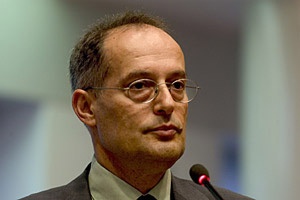UN Special Rapporteur: The dismal state of human rights has remained unchanged in Belarus

“The dismal state of human rights in Belarus has not changed since the October 2015 presidential election”, says the statement of the UN Special Rapporteur on Belarus.
«During the last four months, no changes have been initiated in Belarus to alter the oppressive laws and practices, while numerous cases of new violations of basic rights have emerged,» Miklos Haraszti, the UN Human Rights Council’s special rapporteur on human rights in Belarus, says in the statement published at the ohchr.org.
He points out that the presidential election, just as all votes since the 1990s, «fell short of democratic standards, and the incumbent was reappointed following an unverifiable turnout and nontransparent ballot count.»
While welcoming the release of the political prisoners in August 2015 and the lack of police violence and arrests of presidential candidates following the election, Miklos Haraszti points out that authorities have not exonerated former prisoners of conscience and have not closed criminal cases against former presidential candidate Ales Mihalevich and journalist Aliaksandr Alesin. He also notes that human rights activist Mikhail Zhamchuzhny remains behind bars, naviny.by quote the statement.
Haraszti calls for radically reforming Belarus’ regulations and government system, noting that it is the only country in Europe that has no opposition in parliament. «The forthcoming parliamentary elections in 2016 will also be an opportunity for the authorities to attest of their commitment to reform,» he says.
Haraszti expresses readiness to help Belarusian authorities hold free and fair parliamentary elections. «Such steps would speak for the willingness of the authorities to improve the human rights situation in the country, and to work toward abiding by international standards,» he says.
The UN Human Rights Council reestablished the position of special rapporteur on Belarus in July 2012, much to the displeasure of the Belarusian government, which warned that it would not recognize the mandate of the rapporteur or cooperate with any person appointed to the position.
Miklos Haraszti, a Hungarian politician, was appointed special rapporteur on Belarus in September 2012 and had his mandate extended in June 2013.
-
03.01
-
07.10
-
22.09
-
17.08
-
12.08
-
30.09



























